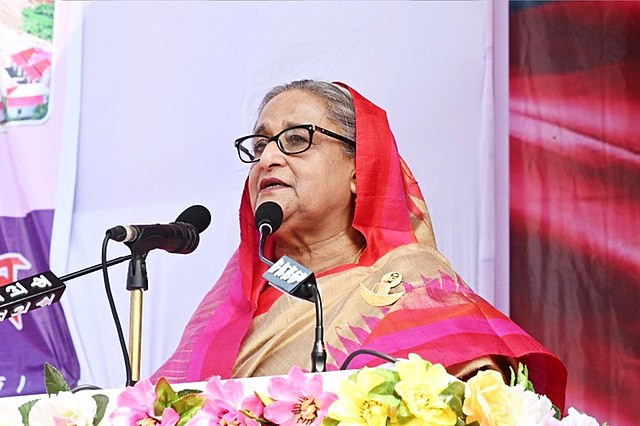Sheikh Hasina, the long-time leader of Bangladesh, was forced to flee the country following a decision by the army not to suppress the mounting protests against her regime. This decisive moment unfolded when the army, led by Gen. Waker-Uz-Zaman, refused to enforce a curfew on the night before Hasina's abrupt departure, signaling the end of her 15-year rule.
Hasina's downfall was precipitated by a series of student-led protests that began in July, demanding the abolition of job quotas for certain segments of the population. Despite the government reversing the decision, the protests escalated into a broader movement against Hasina's administration. The situation reached a boiling point last Sunday when at least 91 people were killed and hundreds injured in nationwide clashes, prompting Hasina to impose a nationwide curfew.
Gen. Waker-Uz-Zaman, who is related to Hasina by marriage, convened an online meeting with his top generals on the eve of her departure. According to two serving army officers, the generals decided that troops would not open fire on civilians. Gen. Zaman subsequently informed Hasina's office that the army would not implement the lockdown she had called for, effectively withdrawing their support.
An Indian official briefed on the matter stated, "The message was clear: Hasina no longer had the army's support." This critical communication has not been previously reported and sheds light on the rapid unraveling of Hasina's control over the country.
Hasina's regime had been marked by a firm grip on power, with her administration arresting thousands of opposition leaders and workers ahead of her re-election in January. However, the massive scale of the protests and a death toll that reached at least 241 made the army's support untenable. "There was a lot of uneasiness within the troops," said retired Brig. Gen. M. Sakhawat Hossain. "That is what probably put pressure on the chief of army staff because the troops are out and they are seeing what is happening."
The first public sign of the army's wavering support came on Saturday when Gen. Zaman addressed hundreds of uniformed officers, urging them to protect lives and exercise patience. This statement indicated that the military would not forcefully suppress the demonstrations, leaving Hasina exposed.
As protests intensified on Monday, Hasina decided to flee. Along with her sister, she left for India around noon, following discussions with her sibling who was visiting from London. Indian Foreign Minister Subrahmanyam Jaishankar later told parliament that New Delhi had urged various political forces to resolve the situation through dialogue, but as crowds gathered in Dhaka, Hasina sought refuge in India.
A Bangladesh Air Force C130 transport aircraft carried Hasina to Hindon air base near Delhi, where she was met by India's National Security Advisor, Ajit Doval. Hasina's departure echoed her previous exile to India following the assassination of her father in 1975. During her years in India, she forged deep connections with India's political elite, which facilitated her rise to power in 1996.
Despite Hasina's abrupt exit, resentment lingered among many in Bangladesh who felt she should not have been allowed to leave. "Personally, I feel that she should not have been given a safe passage," said retired Brig. Gen. Mohammad Shahedul Anam Khan, one of the many who defied the curfew to join the protests.
Nobel Laureate Muhammad Yunus Named Interim Leader
Following Hasina's departure, Nobel Peace Prize winner Muhammad Yunus was appointed as the interim leader of Bangladesh. Yunus, a long-time political adversary of Hasina, was chosen after a meeting between President Mohammed Shahabuddin, military leaders, and student leaders. The 84-year-old Yunus, known for his pioneering use of microloans through Grameen Bank, has pledged to guide the country through this transitional period.
"When the students who sacrificed so much are requesting me to step in at this difficult juncture, how can I refuse?" Yunus said. His appointment followed weeks of deadly protests, which culminated in more than 400 deaths due to clashes between government forces and protesters.
Yunus's rise to interim leader is seen as a significant shift in Bangladesh's political landscape. Rights groups have criticized Hasina's tenure for silencing dissent and jailing political opponents. With Hasina now in exile, there is hope among many for a more democratic and transparent governance structure in Bangladesh.




